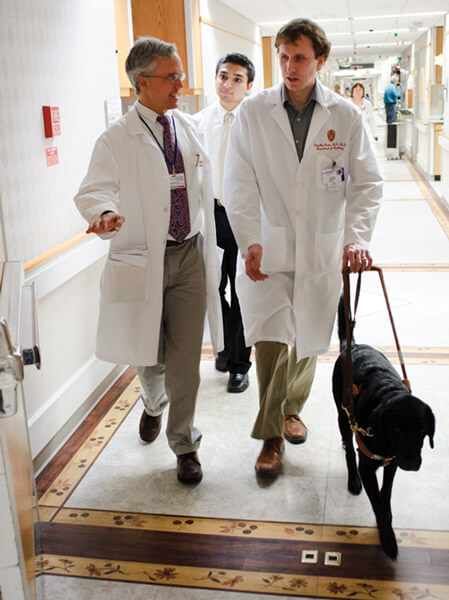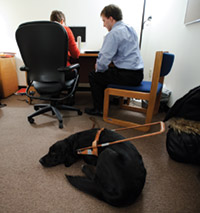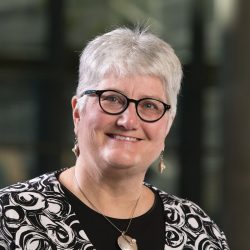Seeing potential
When the UW’s medical school gave Tim Cordes a chance, he exceeded expectations, teaching others that being blind needn’t destroy one’s dreams.

With guide dog Bella leading the way, Tim Cordes talks with physician Michael Peterson, left, and medical student Dhaval Desai, behind, as they do a morning round of patient consultations at UW Hospital.
A morning in the trenches of the Psychiatry Consultation Service at UW Hospital is like a visit to a MASH unit of the mind.
Medical students scurry out the door to evaluate hospitalized patients who are suffering from both psychiatric and medical illnesses, and then return with their observations.
When medical student Tabatha Williams MDx’12 describes a patient who attempted suicide after her painkiller prescription was not renewed, Tim Cordes MD’04, PhD’07 reacts with concern. While the patient is insisting on going home, both student and doctor worry about another attempt.
“If nothing at home has changed, and she has no support, why would we expect things will be better?” asks Cordes, as he uses a computer voice program to navigate Google. He’s looking for a social worker or police officer in the woman’s hometown, someone who could ask a judge for an emergency hold and keep her hospitalized for another three days.
“Hi, this is Tim Cordes, I’m a physician at the University of Wisconsin,” he says, making the first of a string of phone calls before he finds someone willing to help on the legal side. That accomplished, Cordes explains to the students that addiction often is the end result of misguided attempts to come to terms with emotional pain. The goal, he says, is to get the patient to develop “a different relationship with [her] pain.”
He signals for his guide dog, Bella. Then dog, doctor, and students set off through the maze of hospital floors to see the patient.
• • •
“See the patient” is an inadequate phrase when applied to Cordes, who has been blind since boyhood. Yet colleagues insist that Cordes, who has an outpatient caseload of about one hundred and thirty patients and oversees psychiatry interns at two hospitals, has unique insight into the minds and bodies of his patients. Williams, a third-year medical student, says that Cordes is an adept listener who picks up things from his patients that others rely upon body language or other visual cues to identify. For instance, she recalls, he can realize that a medication is creating side effects based on the sound of a patient’s voice.
“His intuition is amazing,” Williams says. “I’m like, ‘Whoa! You picked up on all that, and you can’t even see the patient?’ ”
Dean Krahn MD’80, chief of psychiatry at the William S. Middleton Memorial Veterans Hospital (VA), says that Cordes “does excellent physical exams.” Using just his sense of touch, Cordes has discovered potentially life-threatening blood clots that others had missed.
But more important, Krahn says, is his ability to connect with his patients. At the VA, Cordes streamlined the process of getting a psychiatric consultation so that patients could be seen more quickly, and he is currently researching better ways to deliver addiction treatment to military veterans in rural areas of Wisconsin. This fall, he will begin a fellowship in addiction treatment at the veterans hospital.
“Tim is a great role model for patients with addiction issues,” Krahn says. “With everything he has had to overcome in his life, it makes it more difficult for patients to tell him that they want to quit, that it is just too hard.”
• • •

As guide dog Bella patiently waits, Tim Cordes reviews patient records and dictates notes, working with Liz Morrison, a retired nurse and one of Cordes’s visual describers.
Tim Cordes was just a toddler when his mom, Therese, heard from doctors at the University of Iowa that her son had a rare genetic condition called Leber’s disease. He will eventually lose all of his eyesight, and he will never drive a car or pilot a plane, they said. And they told her to think seriously about putting him in a special school for blind children.
“My mom cried all the way home,” Cordes told the Madison Civics Club, “and then promptly forgot everything the doctors told her.”
As Cordes gave his speech to an audience of about five hundred last year, his mother sat at a table up front, with his wife, Blue-leaf Cordes ’97, PhD’04, MD’06, and their two young sons, Peter, now four, and Paul, one.
Just one of Cordes’s many achievements would make most mothers glow. He earned black belts in jujitsu and tae kwon do, composed music, learned to water-ski, and carried the Olympic torch in 2002.
Cordes graduated as valedictorian of his Notre Dame class in 1998, after earning a degree in biochemistry and doing research on antibiotics. Then he encountered another group of people who told him he couldn’t achieve his next dream: going to medical school. Although he had a resume that would make anyone else a shoo-in, eight medical schools rejected him. Only the Wisconsin School of Medicine and Public Health gave him a chance — and then only after some rather intense debate by the admissions committee.
When Cordes entered medical school in summer 1998, he was the third blind medical student in the United States. Not everyone was convinced he should be there, including a fellow student who sidled up to him during his first week and snidely asked, “What are you doing here?”
But Cordes persisted, plunging his hands into cadavers to pull out and feel the organs, and earning kudos from surgeons and anesthesiologists alike. All praised his intense preparation, which allowed him to place a tube in a patient’s windpipe correctly the first time. In his third year, he won “student of the year” honors from both the obstetrics-gynecology and anesthesiology departments, meaning he was the top student out of one hundred and fifty in those rotations.
Wisconsin made a number of modifications for him. The school supplied an Optacon, a machine that converts visual images into raised lines, and a computer that reads notes at a frenetic clip of five hundred words a minute. The Iowa Department for the Blind, from Cordes’s home state, hired “visual describers,” assistants who went through the clinical rotations of medical school with him, describing what they saw and fulfilling duties such as guiding him into the operating room while he held his sterile hands aloft to avoid contamination. They also accompanied Cordes through his stints at rural and specialty clinics, including neurology and family practice. And when he was on twenty-four-hour call at the hospital, they slept there, too.
Liz Morrison, one of the visual describers and a retired nurse, was there the night Cordes delivered his first baby. The delivery went fine, except that Vance, Cordes’s German shepherd service dog, wanted to be in on the action.
“Basically, Tim delivered the baby and I held back Vance,” says Morrison, who still works part time with Cordes, helping him fill out medical paperwork for his patients.
But what Vance lacked as an obstetrical assistant, he more than made up for during Cordes’s psychiatry residency. Krahn, at the veterans hospital, recalls that he initially worried about Cordes’s vulnerability, because residents can encounter seriously mentally ill patients who can be unpredictable, and occasionally, violent. He needn’t have worried.
“Vance was the second-best observer in the room when it was Tim, Vance, and me,” says Krahn, who ranks Cordes first. He said the dog was “uncanny” at being completely alert to any unusual movements in a room, while looking like he was totally at rest.
“I didn’t have to worry that anything or anybody would get past Vance,” Krahn says. “Vance seemed to know when the interview was coming to a close and would stand, but remain right at Tim’s side.”
But medical school, followed by residency, was hard on the old dog, who wouldn’t eat when he was at the hospital because he knew he was still on duty. Vance retired in summer 2010, and now lives with Cordes’s parents. His new dog, Bella, a young golden retriever-Labrador cross, has a decidedly different therapy style. She bangs her tail enthusiastically on the floor whenever people enter the room. And when Cordes gives her the hand signal, she rubs her head on his lap, giving him a full body wiggle of affection.
Cordes says that Bella likes everyone, which helps put patients at ease. So far, he has yet to encounter a patient who didn’t want to be treated by a blind physician, but he says he would be fine with a patient requesting another doctor, saying simply, “It’s about them getting the best care; it’s not about me.”
• • •

With earphones in place, Tim Cordes listens to computer-translated audio of medical charts as he and a medical team at UW Hospital discuss that day’s caseload of patient consultations.
Cordes is a classic Midwesterner, with a low-key style that seems at odds with his drive and accomplishments. So let the numbers tell the story: he was selected for one of 140 spots in the UW medical school from a pool of about 2,300 applicants. The MD/PhD program is even more selective, admitting just eight out of 200 applicants. When Cordes earned his PhD in biochemistry, he became one of 139 blind or visually impaired scientists or engineers in the United States earning doctorates, according to the National Science Foundation. Oh, and when he was working on his doctorate, he needed a way to describe complex molecules. Because he couldn’t see them, he wrote a computer program that uses sound — going up and down the scale, and getting louder and softer — to explain the branching arms of a lethal bacterial protein. His software, Tonal Interface to Macromolecules — Tim Mol for short, is available to others who might need it. And his doctoral research helped scientists to better understand the virulence of Pseudomonas aeruginosa, a bacterium deadly to patients with cystic fibrosis.
If more students could get help that compensates for their disabilities, they could achieve what he has, Cordes believes. To share that idea, he addressed the 2010 National Federation of the Blind’s convention and contributed a chapter to an Association of American Medical Colleges guide to making medical schools more accessible to students with disabilities.
So far, no blind students have followed him at the UW’s School of Medicine and Public Health, but the school currently has two students with hearing impairments: Josh Reiher, who will be in his fourth year this fall, and Steven Tang, who will be a third-year student. To accommodate their needs, the school hired three sign-language interpreters who have backgrounds in health care.
Patrick McBride MD’80, the school’s dean of students, says that while it is a major — and expensive — undertaking to work with students with physical challenges, he thinks more medical schools should open their doors because these students teach their peers so many lessons.
“The legacy of Dr. Tim Cordes still has a profound impact on our school, faculty, and students,” McBride says. “Tim set an example for all of us that we can overcome significant challenges with determination, dedication, perseverance, and the support of others. Students and I still talk about what he taught us, especially with his incredible attitude and preparation for his work. Sometimes when I get down or think that something is too hard to do, I think of how Tim would respond and I just get to work.”
Because Cordes knew there were some specialties to which he could not aspire, McBride says he approached every opportunity — whether assisting with the birth of a baby, helping during surgery, or intubating a patient — with a “sense of reverence and wonder.”
Dan Albert, emeritus chair of ophthalmology and visual sciences at the UW, is pleased to see the shift in attitudes. He recalls serving on the admissions committee at Harvard Medical School twenty years ago, when, despite the impassioned pleas by Albert and other members of the committee, the school rejected a “dream candidate” because he was deaf. Today Albert serves as a mentor for one of the UW’s hearing-impaired medical students.
“Not only do these gifted disabled physicians benefit medicine, sciences, and their patients, but their classmates learn from them,” says Albert, who is also a historian of medicine. “[Classmates] gain empathy for people with disabilities, and learn a lesson in courage.”
• • •
Given his achievements, Cordes could have gone many directions with his career. So why pick addiction treatment, an area with low levels of success and high levels of frustration?
“I think addiction is a good model for understanding all kinds of self-defeating behavior,” he says. “To be a good general psychiatrist, you need to understand addiction.”
And, Cordes adds, psychiatry needs to do better by people who have addiction issues. In many cases, he says, they are abusing substances because they have untreated psychiatric problems that need attention or because they are in physical pain.
“I think we automatically assume that pain equals suffering,” he says. “But that is not always the case. I would guess that Brett Favre was in pain during his last season of football, but was he suffering?”
Rather than always seeking to “bring the pain down” with narcotics, psychiatrists can help “bring the person up” so the pain is more tolerable, he says.
Back at the Psychiatry Consultation Service, Cordes is talking to medical students about having empathy for patients with addiction issues. One student observes that a patient is rejecting any psychiatric care, and seems interested only in “drug seeking” — obtaining another prescription for pain medicine. Cordes tells the students that convincing patients to seek solutions outside of drugs can be the best medicine.
“People with substance-abuse issues always think that the solution to their problem is in the next pill,” he says. “Sometimes we have to help them take a step back. With time and support, they can learn to develop a different relationship with their pain.
“Remember,” he tells the students, “we’re in this business because we care about people.”
Cordes’s patients see that compassion — along with a gift of intellect — in their doctor, a young man who was told repeatedly that he should give up on his dream.
“Fourteen years ago, when I was knocking on the doors of medical schools, I heard that all the time,” Cordes says. “One school opened that door, and that was the University of Wisconsin.”
Susan Lampert Smith ’82 is a senior media specialist for UW Health Public Affairs.
Published in the Summer 2011 issue


Comments
Bill Breisch June 12, 2011
What a great person to feature in this article. Am so glad that Tim Cordes became a physician. He’s got all the makings of an outstanding physician.
Glad also to see the author of the fine article is Susan Lampert Smith, a wonderful writer who used to write very insightful, helpful articles for the Wisconsin State Journal. Nice work again, Susan!
I just shared this article with a friend who is blind, is a student at MATC and hopes to attend UW-Madison, majoring in social work. He was very interested in hearing about Tim Cordes. I believe this friend will be highly successful in his future career, too.
Tim Cordes is a model for all of us. Thanks for highlighting his remarkable life!
Liz Morrison June 13, 2011
I am the retired nurse and visual describer referenced in the article on Dr. Cordes. I have worked with Tim since his 3rd year in medical school. It has been my great honor to have worked with Tim all these years. He is truly amazing. I have learned a lot of medicine from him. I’ve also learned what true compassion really is. Tim is my hero.
Kristi Sazama, Puppy Raiser for Leader Dogs for the Blind June 14, 2011
I am one of several Puppy Raisers for Leader Dogs for the Blind, Chippewa Valley Group out of Eau Claire, Wisconsin.
This article Seeing Potential was shared among our group of puppy raisers at our June meeting. We find this story to be very inspirational for our efforts in raising pups during their crucial first year of life by “socializing”, going out in public places. Thank you, editors of On Wisconsin, for sharing this amazing story of Tim and the support and adaptations in his journey. I especially can relate to the presence dogs add to our social interactions as mentioned in this story.
Kristi Anderson Sazama ’78
Eve Galanter June 17, 2011
Thanks to Susan for bringing attention to Dr. Cordes, his fabulous accomplishments, the critical role the UW School of Medicine and Public Health has played, and the incredible presentation he made to the Madison Civics Club last year as part of our series “Defying the Odds: When They Said It Couldn’t Be Done.” Dr. Cordes’ presentation, even the title, “How I See Possibilities,” showed us a man whose sight may be impaired, but not his vision. The Madison Civics Club will be celebrating our 100th anniversary beginning this fall. Check our website http://www.madisoncivicsclub.org for information about the fabulous speakers we’ve got lined up and join us!
Eve Galanter, Chair, 100th Anniversary Committee
Tess Lindsay June 17, 2011
I am one of the three visual describers who works with Tim. I have worked with him for the past eight years and consider it a privilege to know him. He is truly inspirational and has made me realize how unaware of our surroundings we sighted people sometimes are and how much we take for granted. Thank you for a wonderful article about an amazing person.
Barbara Brzenk June 22, 2011
As an educator, I have always believed that teachers must expect and lead students to reach their highest level of achievement. Here is a perfect example of believing in a student enough so that the student could reach an attainable goal very few thought possible. Therefore , the following has always been my philosophy: “A child can count the seeds in an apple but not even the wisest man can count the apples in an apple see,”
Jahlay Dominguez July 22, 2011
I’m not blind, or deaf, or have any sort of disabilities, I’m just a normal girl who is starting school here next fall. I’m always worried about doing well at this school, but this article inspired me. If Tim can finish Med school and get a PHD despite being blind, I should be able to achieve my dreams right? Thanks Tim, don’t let anyon bring you down!
Philip M. Farrell, MD, PhD [Emeritus Dean, UWSMPH} July 23, 2011
Congratulations to Tim, who continues to be a “superstar” in academic medicine, and our Department of Psychiatry. His accomplishments have enhanced the international reputation of the UW School of Medicine and Public Health and UW_Madison. Ironically, when Tim was accepted into our MD/PhD program while I had the privilege of serving as Dean, we received much criticism from medical education leaders, including some at the Association of American Medical Colleges. However, after Tim began distinguishing himself consistently with so many brilliant accomplishments and certainly by the time he graduated, the national attitude reversed and the UW-Madison was praised for helping “pave the road” for others with handicaps. Tim has inspired so many others that we’ll be eternally grateful to him. Best wishes, Tim.
—Phil Farrell
Neerav July 23, 2011
Wow, Tim Cordes is a hero. This makes me proud to attend UW-Madison.
david kyeu July 24, 2011
Coming from Africa where some of the blind people’s potential is taken for granted, I now have Tim Cordes as my perfect example for encouraging my fellow African friends. Praise be to God!
Sarah Kruger July 27, 2011
Tim- I recall “seeing” you in the hallways of UW hospital and thinking, “wow,” what an incredible opportunity we have at our institution. Opportunity to view a dynamic, dedicated individual. Opportunity to think beyond conventional ways of teaching. Opportunity to reach patients in ways we never imagined. This is not only a story of the power of the human spirit, but of how we can match human talents and perseverance to the many complex needs of society. Thank you Tim and all whom have supported you in your quest to make a difference in the lives of others.
Sarah Kruger
Clinical Professor
School of Nursing
Elianna Fred July 28, 2011
As a pre-med student there are so many times when I think something is too hard or that I just don’t have it. This story makes me believe that ANYONE who has the will and determination to pursue their dreams can do it. Truly inspiring.
Eka UdoAffah July 29, 2011
This is a very impressive story. Obstacles may hinder talents but determination could lead to unenvisaged levels of successes. It takes determination and strong will to achieve a dream. This story shows that nobody should be written off no matter the magnitude of problems that the individual may be facing at any point in time. Some measure of encouragement or support could bring out gold from the mud. May we learn to be instruments for positive endavors.
Ami July 31, 2011
Talents take many amazing forms, but they can be easily missed for that which is only immediately apparent. Sadly, individuals and our society often lose out because of that blindness. This well-written article gives us all a much needed reminder of the tremendous potential in every human, no matter what external limits he/she faces.
More importantly though, a person’s heart is his deepest source for giving to others, as well as his most vulnerable part. May we take care to follow the examples of people like Tim, and nurture our own heart’s capacity for compassion. May we practice accepting ourselves and others as we are, love deeply, help as we have opportunity, and encourage one another to persevere in doing good.
LaVonne Callender August 30, 2011
I have a brother that is legally blind and has been turned down many of times for even a job just because of his blindness. I wish someone like Tim Cordes could reach out to him and help him in any way they could. He is getting to the point in his life where he is becoming very discouraged. He is one of the smartest men I know and still amazes me at what he can do even with his dissability. He is really becoming discouraged with life and people because of being shot down sooooo many times because he is blind. If there is anything you can do to help him I would appreciate it tremendously!!!. Thank you soooo much for listening and I do hope to hear from you in the near future. God Bless!
LaVonne Callender.
My Brother’s Name is Clarence Ayers and lives in Canton Ohio at present. If you need any furhter information please let me know and I will forward it on ASAP. And please don’t let him know I did this because he is a very proud man and besides I would like my crown in heaven not here on earth.
Patricia Farhoomand October 13, 2011
My brother in law, Michael Farhoomand (alumni) shared this story with me and my husband. One of our grandsons is blind and a junior in high school. I told Avery (my grandson) about this article yesterday, and he asked me to email it to him. I am asking for your permission to copy and email to him so that he can read it. Avery is a very bright young man. He has been thinking about his career goals and was excited when I told him about this story.
Thank you for your help in this matter.
Sincerely,
Patricia Farhoomand